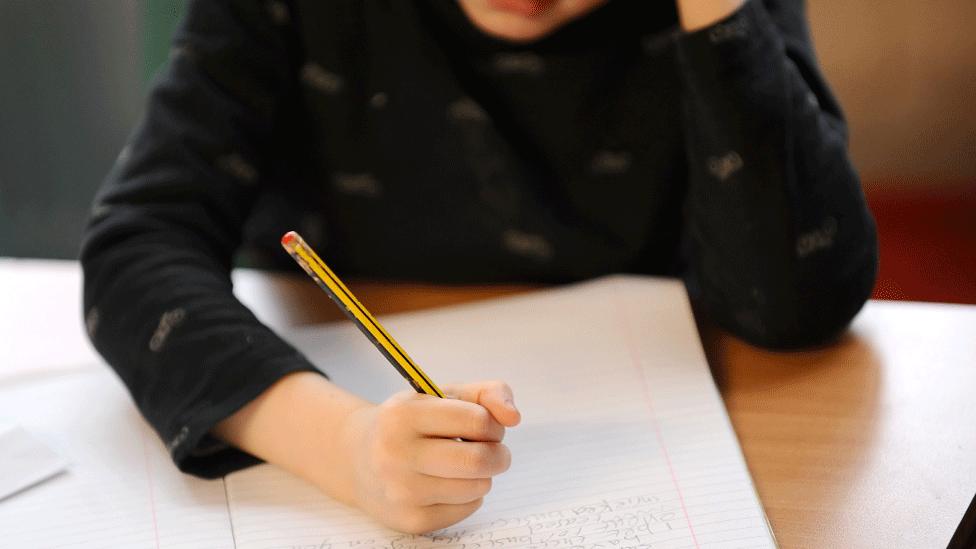P1 assessments to continue with 'important modifications'
- Published

The government insists the assessments are not high-stakes tests
Standardised assessments for P1 pupils should be allowed to continue if "important modifications" are made, an independent review has concluded.
Education Secretary John Swinney announced a review of the tests after MSPs voted urging him to "halt" them.
This followed concerns about how the assessments are put into practice and how useful the data they produce is.
However, an external review has found that the tests "should be continued" if some "important issues" are addressed.
Mr Swinney said the review was not an "unqualified green light", but said he was "determined to take the valuable learning within the report and act on it".
But opposition parties accused Mr Swinney of "ignoring the views of teachers", saying that "the testing of P1 pupils should stop".
Standardised assessments were introduced across Scotland in 2017 in a bid to gather more data about children's progress, with literacy and numeracy tests at P1, P4, P7 and S3 level.
The government insists these are not high-stakes tests, and provide teachers with useful information to make early interventions where pupils might be struggling.
However, there has been opposition from groups including the EIS teaching union, political parties, and parents groups like Upstart Scotland.
Some oppose any form of testing in P1 in principle, some argue against how the scheme has been put into practice, and others argue that the assessments are a waste of time for teachers and do not give them any information they did not already have.
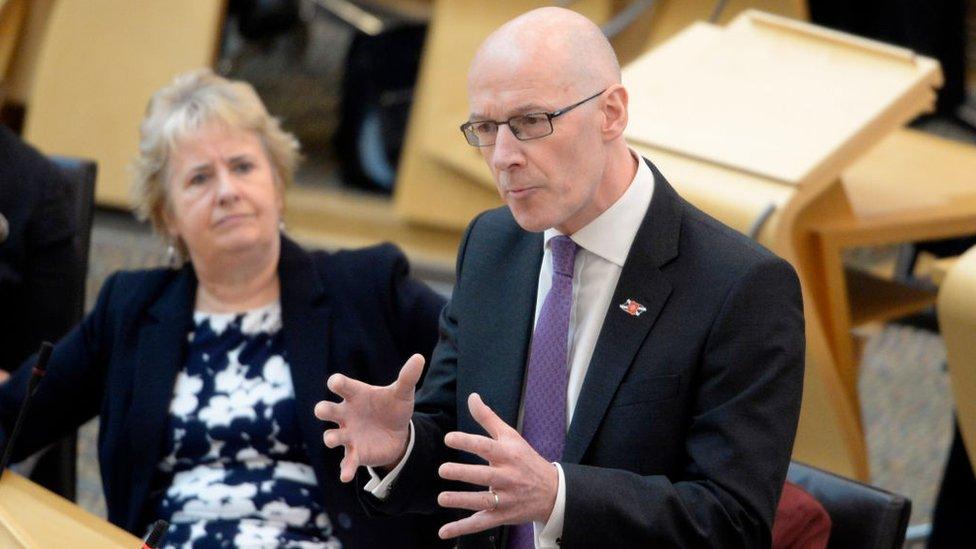
John Swinney gave MSPs an update on the assessments scheme
Mr Swinney announced a review of the assessments in October, in the wake of a defeat in parliament where opposition parties passed a motion calling on ministers to "halt" them for P1 pupils.
It was carried out by David Reedy, who was co-director of the Cambridge Primary Review Trust and both general secretary and president of the UK Literacy Association.
His review concluded that standardised assessment data "offers a useful standard element within the overall evidence to inform judgements about learning and teaching".
He said that the level of support given to pupils "varies widely" from school to school, making it difficult to draw conclusions beyond a class or school level, and that there was no evidence that data was being used to create league tables.
Mr Reedy also said there were "concerns about the time and staffing needed" to carry out the assessments, but that these could be overcome via "careful planning, focused teaching and managed sharing of technology".
He concluded that the system "has potential to play a significant role in informing and enhancing teachers' professional judgements and should be continued with modification and safeguards against a drift towards high stakes".
He added that "some important issues remain to be addressed", including over the purpose of collecting data at a national level and what it should be used for, calling for a "clear and irrefutable statement of the purposes and uses of data".

What are the tests like?
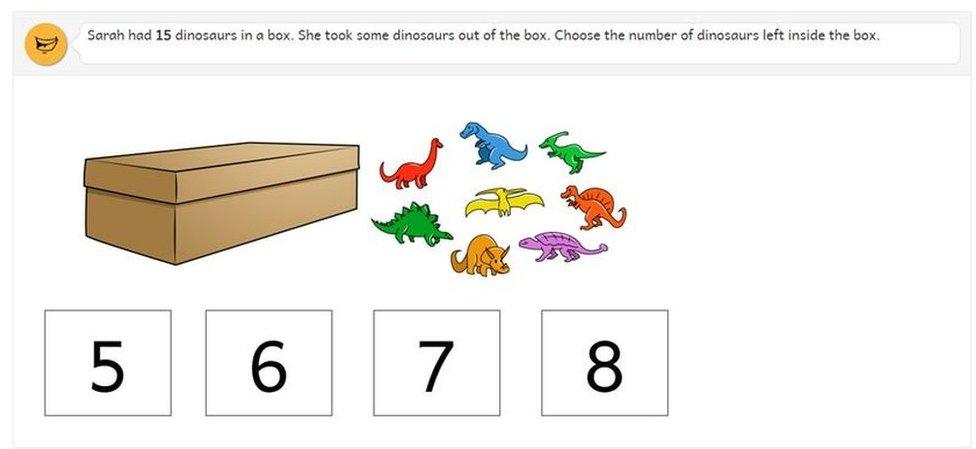
Pupils are given standardised numeracy and literacy assessments in P1, P4, P7 and S3
The government was always keen to demonstrate that the assessments were not "high stakes tests", were not used to stream or set children and were not carried out in anything remotely like exam conditions.
They are designed to seem like a computer game - a child is not told if an answer is right or wrong but, if they are making good progress, the questions become progressively more challenging.
There were claims that some children had been left distressed - although Mr Reedy's report said there was "scant evidence" for this, saying it was possible that the attitude of teachers could have more of an impact on pupils.

Mr Swinney told MSPs that there was still "work to be done", but said that "with the improvements proposed we can move forward in the correct direction".
He said: "As parliament requested, I have reconsidered the evidence. As we approach the end of the second year of delivery, we now have a far clearer picture of the views of both P1 children and their teachers towards these assessments.
"An impartial review has confirmed the value of them. A constructive action plan for enhancing the assessments, consolidating their value and delivering on their potential has been laid out.
"I hope that members will join me in accepting Mr Reedy's findings and in focusing, as we must, on delivering an education system in Scotland which raises attainment for all, closes the attainment gap, and enables all children and young people to fulfil their potential."
However Larry Flanagan, general secretary of the EIS union, said the 28 recommendations for improvement made in the report "would seem to be a clear indication that the Scottish government got it wrong on P1 standardised assessments the first time round".
He said "insufficient time" was taken to communicate the purpose of the tests to schools, saying they were now set to be given a third set of guidance within the first two years of the system.
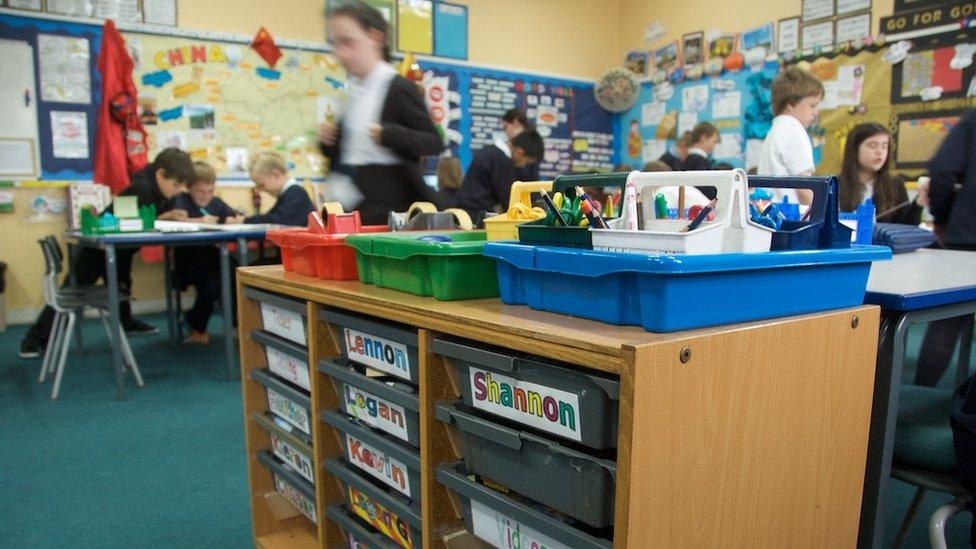
The assessments were introduced across Scotland during the 2017-18 school year
Opposition parties hit out at Mr Swinney's conclusions, with the Scottish Conservatives accusing the education secretary of having "his head in the sand".
Education spokeswoman Liz Smith said: "He refuses to get the message that the Scottish Parliament voted to halt the P1 tests because all the opposition parties were listening to the concerns expressed by primary school teachers, parents and educational experts.
"What has been published today does not answer these basic concerns."
Labour's education spokesman Iain Gray said it was "an act of supreme arrogance for John Swinney to continue to defy the will of the Scottish Parliament".
He said: "The review reflects many of parliament's concerns, including the lack of a clear rationale for the tests. It says the results cannot provide national data or compare school with school in the way ministers have repeatedly said they could.
"Parliament was right in September and it is still right today - the testing of primary one pupils should stop."
Green MSP Ross Greer said the purpose of the tests was still not clear, while Lib Dem Tavish Scott said the review was a "stitch-up" which Mr Swinney had commissioned to "prove himself right".

Analysis by Jamie McIvor, BBC Scotland education correspondent
The opposition to P1 assessments was always a mixture of what might be called the "three Ps" - the principled, the practical and the political.
The principled is largely driven by the belief anything which might resemble testing in Primary 1 - however benignly implemented - is simply inappropriate. Ultimately this touches on the argument that the age children start school at should be raised.
The practical surrounds the details. And there is no doubt the government's political critics could also sense blood.
The principled concerns all fuel part of the wider debate about education. But the government will be hoping the practical concerns of some teachers and parents can be dealt with.
One question concerns how well the scheme is understood by the public. Are headlines which talk of "tests" fuelling misconceptions?
But such is the passion surrounding this debate it is unlikely to die down quickly.
- Published14 August 2018
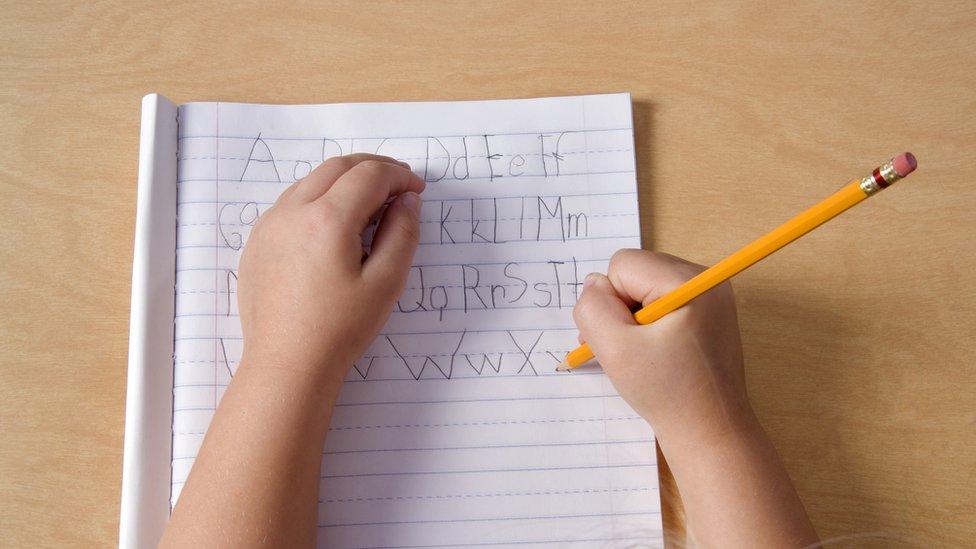
- Published18 April 2019
